Business Law Assignment: Analysis of Contract and Tort Law Issues
VerifiedAdded on 2021/04/24
|6
|1360
|163
Homework Assignment
AI Summary
This business law assignment addresses several key legal issues. The first question explores negligent misrepresentation, analyzing Emma's liability for providing incorrect information to Richard, referencing the case of Howard Marine and Dredging Co Ltd v A Ogden & Sons (1978). The second issue examines promissory estoppel, determining whether George can enforce Richard to pay extra rent despite a prior promise, referencing Central London Property Trust Ltd v High Trees Ltd (1947) and Woodhouse A.C. Israel Cocoa Ltd v Nigerian Product Marketing Co Ltd (1972). The third question focuses on contract law, specifically the validity of an offer and counteroffer between Richard and Tom, referencing Hyde v Wrench (1840) and Turner Kempson and Co Pty Ltd v Camm (1922). Finally, the assignment assesses whether a contract exists between Richard and Martin based on past consideration, referring to Roscorla v Thomas (1842). The assignment utilizes Australian law and case precedents to analyze each scenario and reach conclusions on the legal obligations of the parties involved.
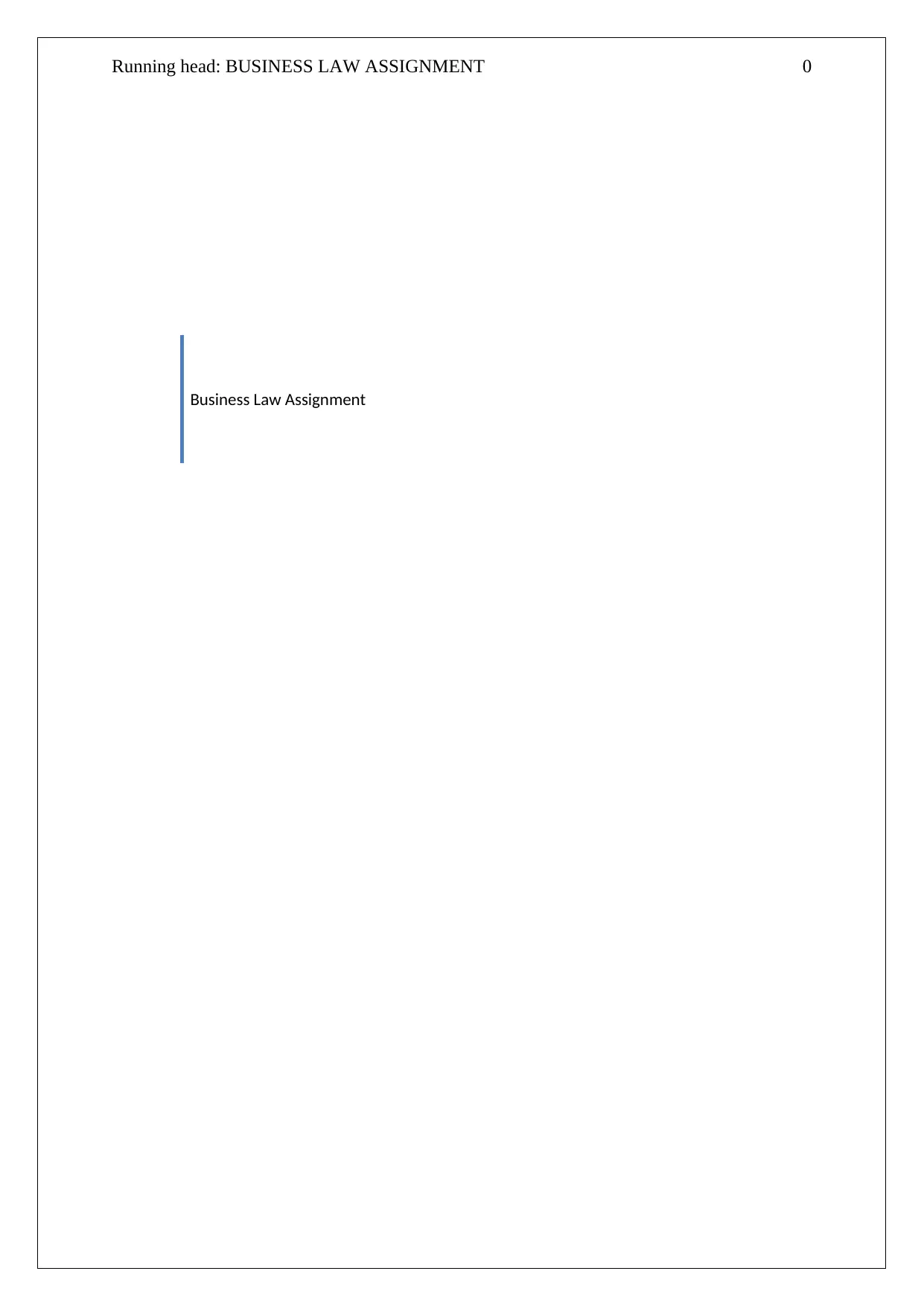
Running head: BUSINESS LAW ASSIGNMENT 0
Business Law Assignment
Business Law Assignment
Paraphrase This Document
Need a fresh take? Get an instant paraphrase of this document with our AI Paraphraser
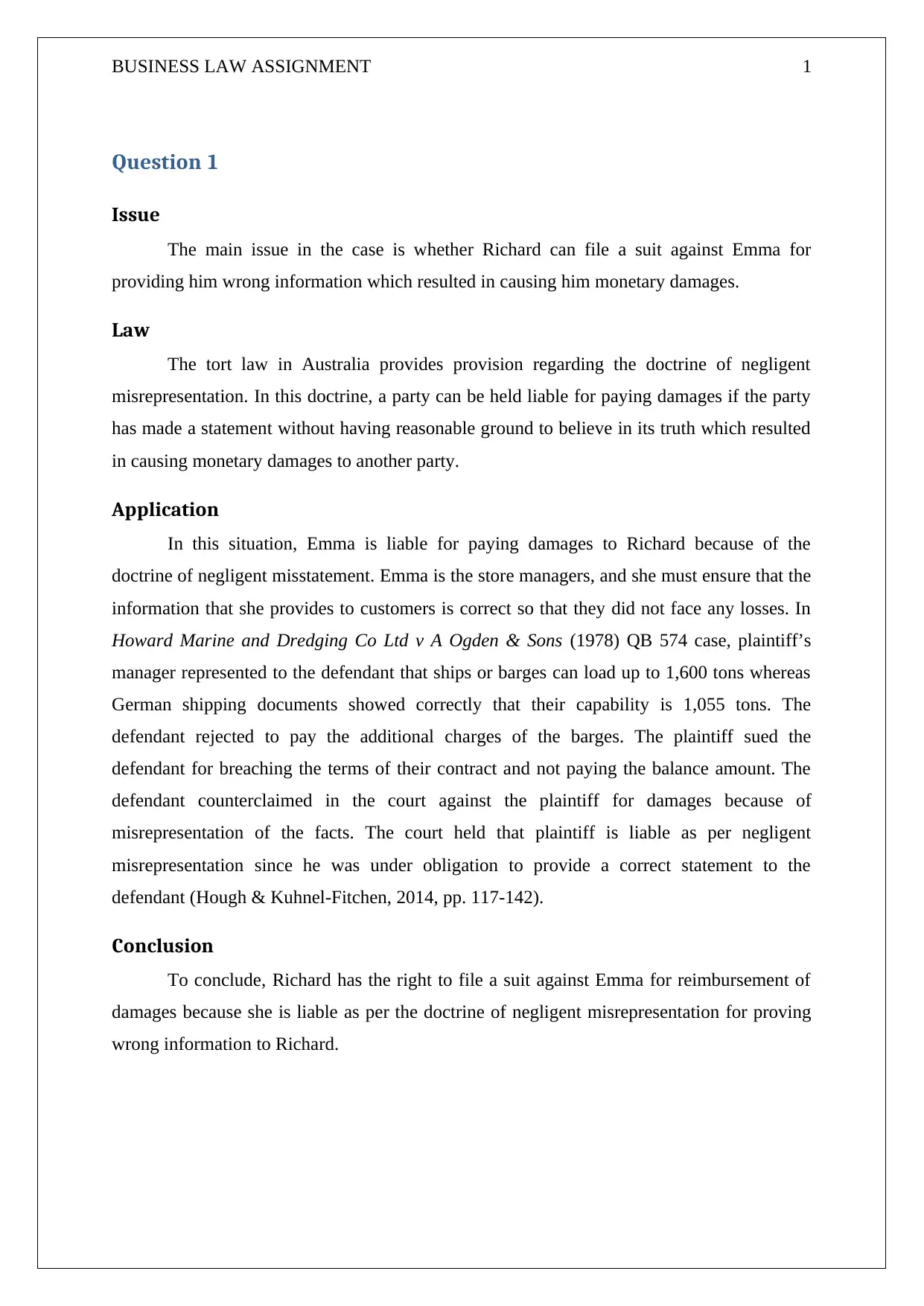
BUSINESS LAW ASSIGNMENT 1
Question 1
Issue
The main issue in the case is whether Richard can file a suit against Emma for
providing him wrong information which resulted in causing him monetary damages.
Law
The tort law in Australia provides provision regarding the doctrine of negligent
misrepresentation. In this doctrine, a party can be held liable for paying damages if the party
has made a statement without having reasonable ground to believe in its truth which resulted
in causing monetary damages to another party.
Application
In this situation, Emma is liable for paying damages to Richard because of the
doctrine of negligent misstatement. Emma is the store managers, and she must ensure that the
information that she provides to customers is correct so that they did not face any losses. In
Howard Marine and Dredging Co Ltd v A Ogden & Sons (1978) QB 574 case, plaintiff’s
manager represented to the defendant that ships or barges can load up to 1,600 tons whereas
German shipping documents showed correctly that their capability is 1,055 tons. The
defendant rejected to pay the additional charges of the barges. The plaintiff sued the
defendant for breaching the terms of their contract and not paying the balance amount. The
defendant counterclaimed in the court against the plaintiff for damages because of
misrepresentation of the facts. The court held that plaintiff is liable as per negligent
misrepresentation since he was under obligation to provide a correct statement to the
defendant (Hough & Kuhnel-Fitchen, 2014, pp. 117-142).
Conclusion
To conclude, Richard has the right to file a suit against Emma for reimbursement of
damages because she is liable as per the doctrine of negligent misrepresentation for proving
wrong information to Richard.
Question 1
Issue
The main issue in the case is whether Richard can file a suit against Emma for
providing him wrong information which resulted in causing him monetary damages.
Law
The tort law in Australia provides provision regarding the doctrine of negligent
misrepresentation. In this doctrine, a party can be held liable for paying damages if the party
has made a statement without having reasonable ground to believe in its truth which resulted
in causing monetary damages to another party.
Application
In this situation, Emma is liable for paying damages to Richard because of the
doctrine of negligent misstatement. Emma is the store managers, and she must ensure that the
information that she provides to customers is correct so that they did not face any losses. In
Howard Marine and Dredging Co Ltd v A Ogden & Sons (1978) QB 574 case, plaintiff’s
manager represented to the defendant that ships or barges can load up to 1,600 tons whereas
German shipping documents showed correctly that their capability is 1,055 tons. The
defendant rejected to pay the additional charges of the barges. The plaintiff sued the
defendant for breaching the terms of their contract and not paying the balance amount. The
defendant counterclaimed in the court against the plaintiff for damages because of
misrepresentation of the facts. The court held that plaintiff is liable as per negligent
misrepresentation since he was under obligation to provide a correct statement to the
defendant (Hough & Kuhnel-Fitchen, 2014, pp. 117-142).
Conclusion
To conclude, Richard has the right to file a suit against Emma for reimbursement of
damages because she is liable as per the doctrine of negligent misrepresentation for proving
wrong information to Richard.
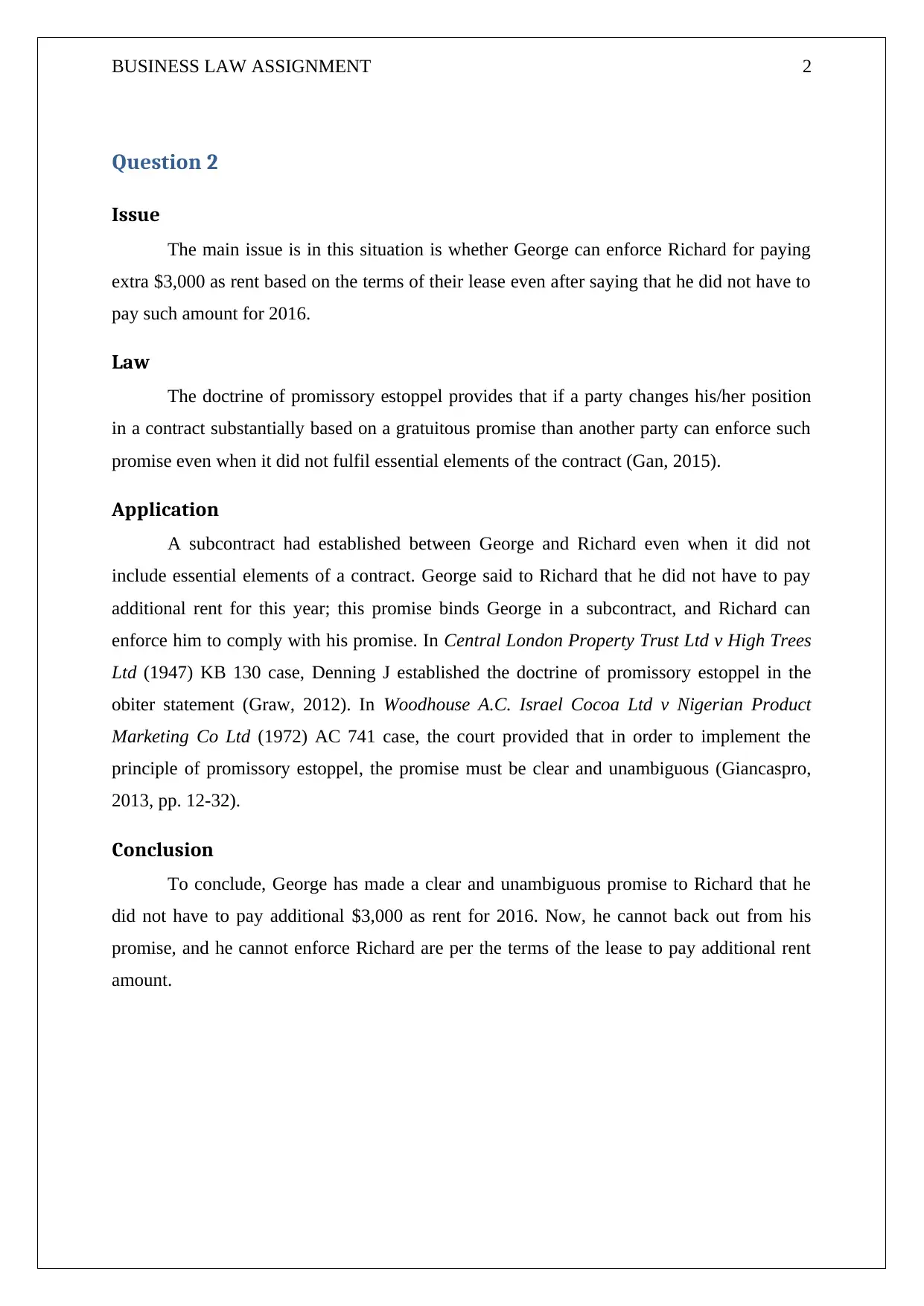
BUSINESS LAW ASSIGNMENT 2
Question 2
Issue
The main issue is in this situation is whether George can enforce Richard for paying
extra $3,000 as rent based on the terms of their lease even after saying that he did not have to
pay such amount for 2016.
Law
The doctrine of promissory estoppel provides that if a party changes his/her position
in a contract substantially based on a gratuitous promise than another party can enforce such
promise even when it did not fulfil essential elements of the contract (Gan, 2015).
Application
A subcontract had established between George and Richard even when it did not
include essential elements of a contract. George said to Richard that he did not have to pay
additional rent for this year; this promise binds George in a subcontract, and Richard can
enforce him to comply with his promise. In Central London Property Trust Ltd v High Trees
Ltd (1947) KB 130 case, Denning J established the doctrine of promissory estoppel in the
obiter statement (Graw, 2012). In Woodhouse A.C. Israel Cocoa Ltd v Nigerian Product
Marketing Co Ltd (1972) AC 741 case, the court provided that in order to implement the
principle of promissory estoppel, the promise must be clear and unambiguous (Giancaspro,
2013, pp. 12-32).
Conclusion
To conclude, George has made a clear and unambiguous promise to Richard that he
did not have to pay additional $3,000 as rent for 2016. Now, he cannot back out from his
promise, and he cannot enforce Richard are per the terms of the lease to pay additional rent
amount.
Question 2
Issue
The main issue is in this situation is whether George can enforce Richard for paying
extra $3,000 as rent based on the terms of their lease even after saying that he did not have to
pay such amount for 2016.
Law
The doctrine of promissory estoppel provides that if a party changes his/her position
in a contract substantially based on a gratuitous promise than another party can enforce such
promise even when it did not fulfil essential elements of the contract (Gan, 2015).
Application
A subcontract had established between George and Richard even when it did not
include essential elements of a contract. George said to Richard that he did not have to pay
additional rent for this year; this promise binds George in a subcontract, and Richard can
enforce him to comply with his promise. In Central London Property Trust Ltd v High Trees
Ltd (1947) KB 130 case, Denning J established the doctrine of promissory estoppel in the
obiter statement (Graw, 2012). In Woodhouse A.C. Israel Cocoa Ltd v Nigerian Product
Marketing Co Ltd (1972) AC 741 case, the court provided that in order to implement the
principle of promissory estoppel, the promise must be clear and unambiguous (Giancaspro,
2013, pp. 12-32).
Conclusion
To conclude, George has made a clear and unambiguous promise to Richard that he
did not have to pay additional $3,000 as rent for 2016. Now, he cannot back out from his
promise, and he cannot enforce Richard are per the terms of the lease to pay additional rent
amount.
⊘ This is a preview!⊘
Do you want full access?
Subscribe today to unlock all pages.

Trusted by 1+ million students worldwide
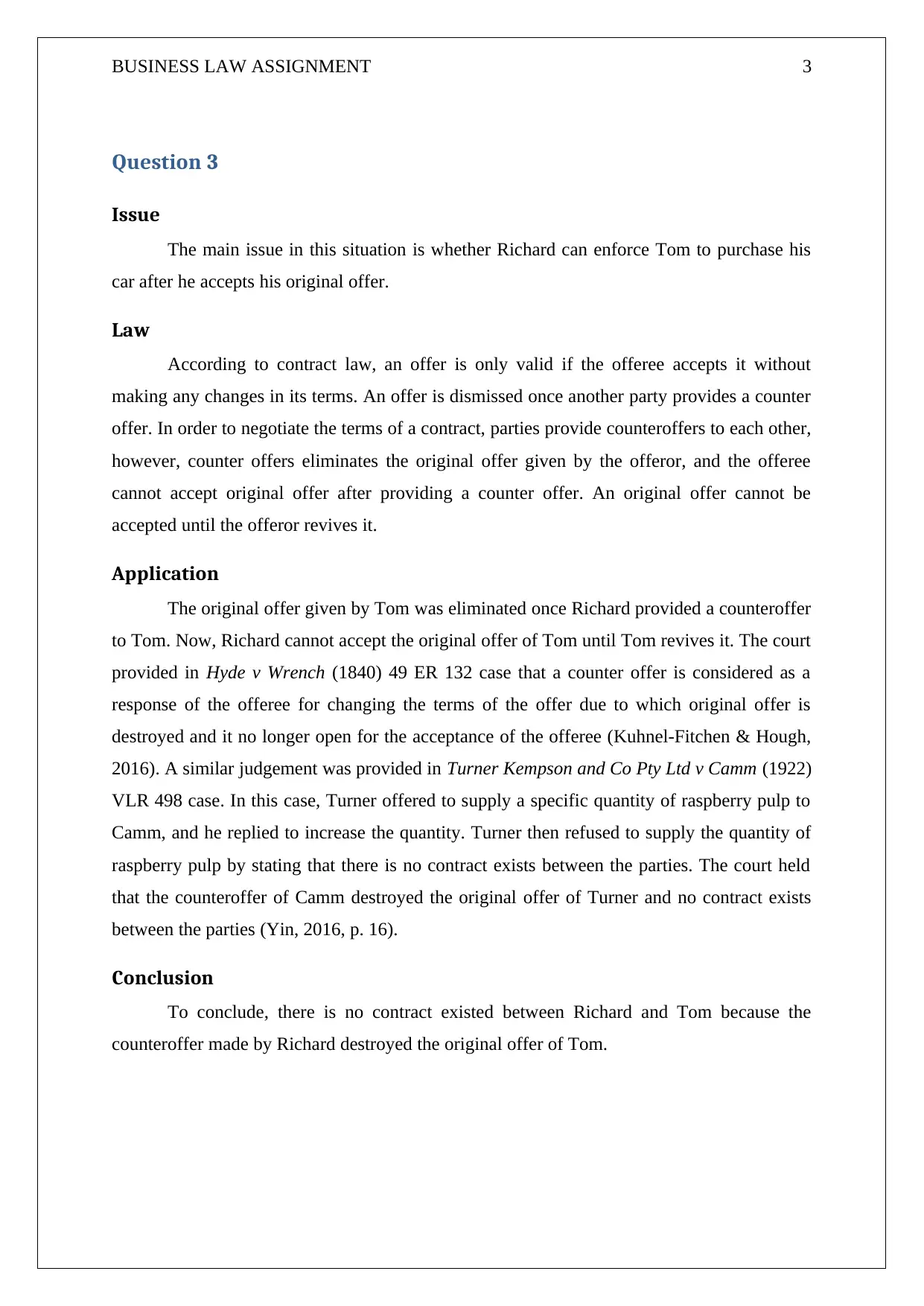
BUSINESS LAW ASSIGNMENT 3
Question 3
Issue
The main issue in this situation is whether Richard can enforce Tom to purchase his
car after he accepts his original offer.
Law
According to contract law, an offer is only valid if the offeree accepts it without
making any changes in its terms. An offer is dismissed once another party provides a counter
offer. In order to negotiate the terms of a contract, parties provide counteroffers to each other,
however, counter offers eliminates the original offer given by the offeror, and the offeree
cannot accept original offer after providing a counter offer. An original offer cannot be
accepted until the offeror revives it.
Application
The original offer given by Tom was eliminated once Richard provided a counteroffer
to Tom. Now, Richard cannot accept the original offer of Tom until Tom revives it. The court
provided in Hyde v Wrench (1840) 49 ER 132 case that a counter offer is considered as a
response of the offeree for changing the terms of the offer due to which original offer is
destroyed and it no longer open for the acceptance of the offeree (Kuhnel-Fitchen & Hough,
2016). A similar judgement was provided in Turner Kempson and Co Pty Ltd v Camm (1922)
VLR 498 case. In this case, Turner offered to supply a specific quantity of raspberry pulp to
Camm, and he replied to increase the quantity. Turner then refused to supply the quantity of
raspberry pulp by stating that there is no contract exists between the parties. The court held
that the counteroffer of Camm destroyed the original offer of Turner and no contract exists
between the parties (Yin, 2016, p. 16).
Conclusion
To conclude, there is no contract existed between Richard and Tom because the
counteroffer made by Richard destroyed the original offer of Tom.
Question 3
Issue
The main issue in this situation is whether Richard can enforce Tom to purchase his
car after he accepts his original offer.
Law
According to contract law, an offer is only valid if the offeree accepts it without
making any changes in its terms. An offer is dismissed once another party provides a counter
offer. In order to negotiate the terms of a contract, parties provide counteroffers to each other,
however, counter offers eliminates the original offer given by the offeror, and the offeree
cannot accept original offer after providing a counter offer. An original offer cannot be
accepted until the offeror revives it.
Application
The original offer given by Tom was eliminated once Richard provided a counteroffer
to Tom. Now, Richard cannot accept the original offer of Tom until Tom revives it. The court
provided in Hyde v Wrench (1840) 49 ER 132 case that a counter offer is considered as a
response of the offeree for changing the terms of the offer due to which original offer is
destroyed and it no longer open for the acceptance of the offeree (Kuhnel-Fitchen & Hough,
2016). A similar judgement was provided in Turner Kempson and Co Pty Ltd v Camm (1922)
VLR 498 case. In this case, Turner offered to supply a specific quantity of raspberry pulp to
Camm, and he replied to increase the quantity. Turner then refused to supply the quantity of
raspberry pulp by stating that there is no contract exists between the parties. The court held
that the counteroffer of Camm destroyed the original offer of Turner and no contract exists
between the parties (Yin, 2016, p. 16).
Conclusion
To conclude, there is no contract existed between Richard and Tom because the
counteroffer made by Richard destroyed the original offer of Tom.
Paraphrase This Document
Need a fresh take? Get an instant paraphrase of this document with our AI Paraphraser
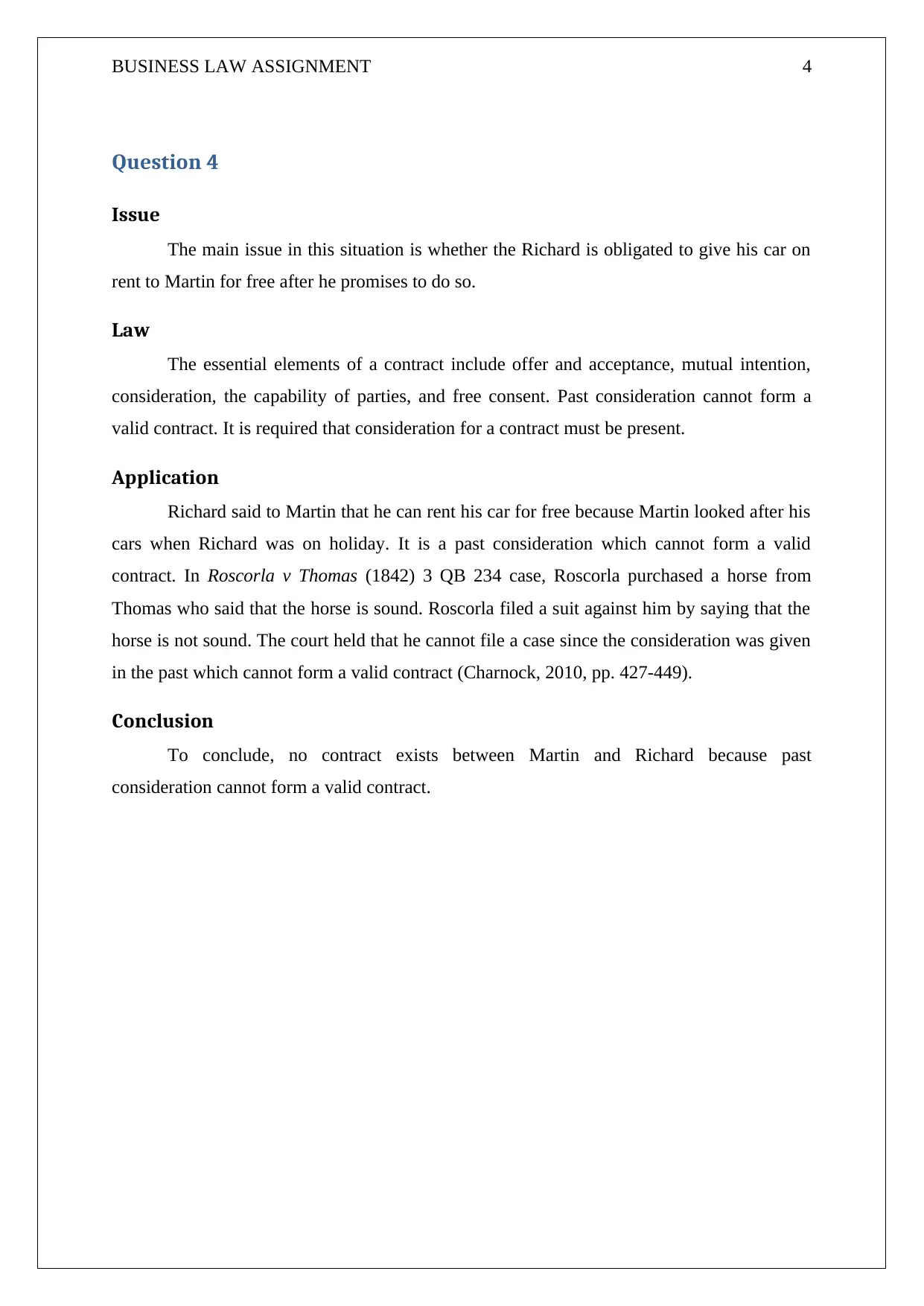
BUSINESS LAW ASSIGNMENT 4
Question 4
Issue
The main issue in this situation is whether the Richard is obligated to give his car on
rent to Martin for free after he promises to do so.
Law
The essential elements of a contract include offer and acceptance, mutual intention,
consideration, the capability of parties, and free consent. Past consideration cannot form a
valid contract. It is required that consideration for a contract must be present.
Application
Richard said to Martin that he can rent his car for free because Martin looked after his
cars when Richard was on holiday. It is a past consideration which cannot form a valid
contract. In Roscorla v Thomas (1842) 3 QB 234 case, Roscorla purchased a horse from
Thomas who said that the horse is sound. Roscorla filed a suit against him by saying that the
horse is not sound. The court held that he cannot file a case since the consideration was given
in the past which cannot form a valid contract (Charnock, 2010, pp. 427-449).
Conclusion
To conclude, no contract exists between Martin and Richard because past
consideration cannot form a valid contract.
Question 4
Issue
The main issue in this situation is whether the Richard is obligated to give his car on
rent to Martin for free after he promises to do so.
Law
The essential elements of a contract include offer and acceptance, mutual intention,
consideration, the capability of parties, and free consent. Past consideration cannot form a
valid contract. It is required that consideration for a contract must be present.
Application
Richard said to Martin that he can rent his car for free because Martin looked after his
cars when Richard was on holiday. It is a past consideration which cannot form a valid
contract. In Roscorla v Thomas (1842) 3 QB 234 case, Roscorla purchased a horse from
Thomas who said that the horse is sound. Roscorla filed a suit against him by saying that the
horse is not sound. The court held that he cannot file a case since the consideration was given
in the past which cannot form a valid contract (Charnock, 2010, pp. 427-449).
Conclusion
To conclude, no contract exists between Martin and Richard because past
consideration cannot form a valid contract.
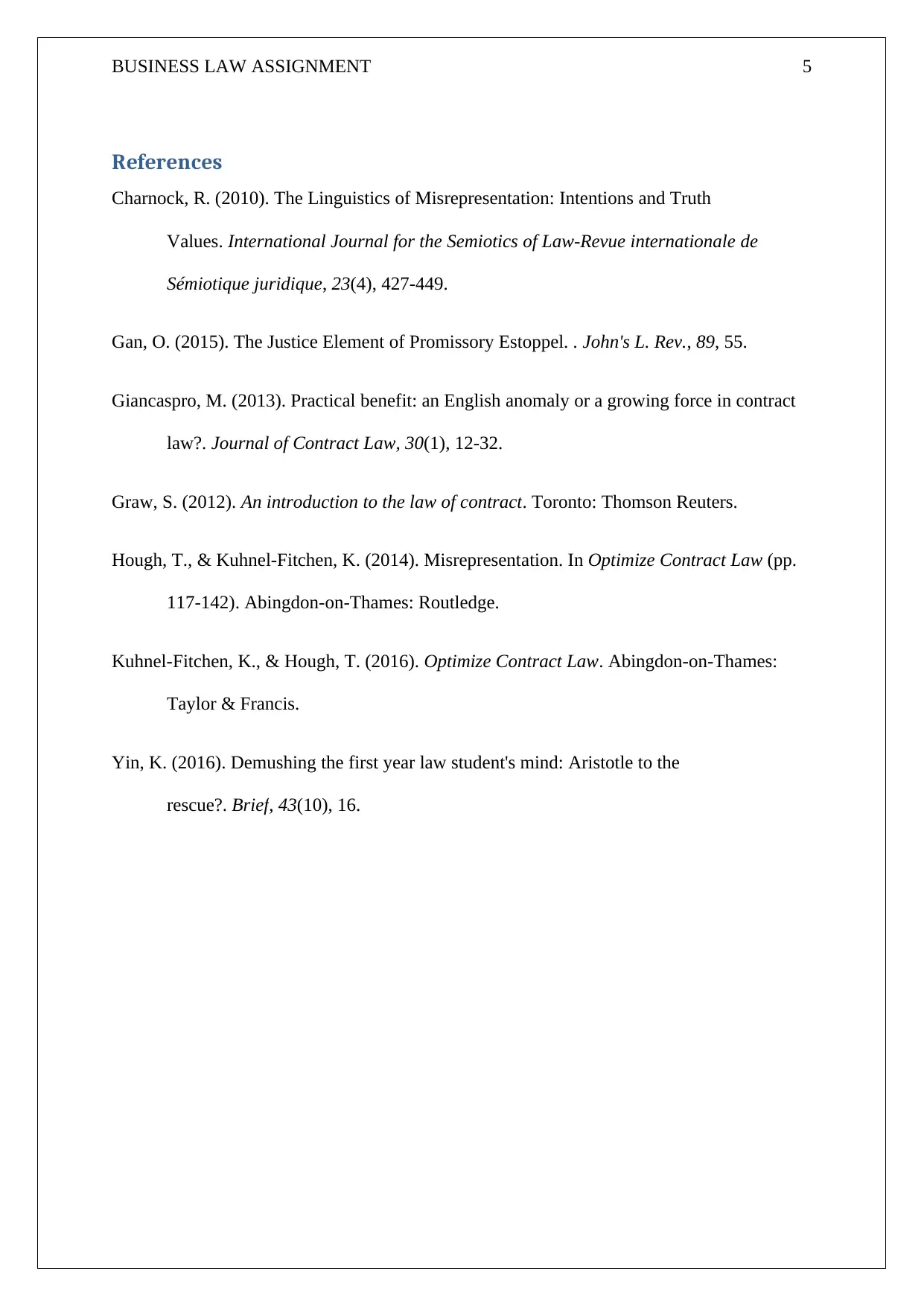
BUSINESS LAW ASSIGNMENT 5
References
Charnock, R. (2010). The Linguistics of Misrepresentation: Intentions and Truth
Values. International Journal for the Semiotics of Law-Revue internationale de
Sémiotique juridique, 23(4), 427-449.
Gan, O. (2015). The Justice Element of Promissory Estoppel. . John's L. Rev., 89, 55.
Giancaspro, M. (2013). Practical benefit: an English anomaly or a growing force in contract
law?. Journal of Contract Law, 30(1), 12-32.
Graw, S. (2012). An introduction to the law of contract. Toronto: Thomson Reuters.
Hough, T., & Kuhnel-Fitchen, K. (2014). Misrepresentation. In Optimize Contract Law (pp.
117-142). Abingdon-on-Thames: Routledge.
Kuhnel-Fitchen, K., & Hough, T. (2016). Optimize Contract Law. Abingdon-on-Thames:
Taylor & Francis.
Yin, K. (2016). Demushing the first year law student's mind: Aristotle to the
rescue?. Brief, 43(10), 16.
References
Charnock, R. (2010). The Linguistics of Misrepresentation: Intentions and Truth
Values. International Journal for the Semiotics of Law-Revue internationale de
Sémiotique juridique, 23(4), 427-449.
Gan, O. (2015). The Justice Element of Promissory Estoppel. . John's L. Rev., 89, 55.
Giancaspro, M. (2013). Practical benefit: an English anomaly or a growing force in contract
law?. Journal of Contract Law, 30(1), 12-32.
Graw, S. (2012). An introduction to the law of contract. Toronto: Thomson Reuters.
Hough, T., & Kuhnel-Fitchen, K. (2014). Misrepresentation. In Optimize Contract Law (pp.
117-142). Abingdon-on-Thames: Routledge.
Kuhnel-Fitchen, K., & Hough, T. (2016). Optimize Contract Law. Abingdon-on-Thames:
Taylor & Francis.
Yin, K. (2016). Demushing the first year law student's mind: Aristotle to the
rescue?. Brief, 43(10), 16.
⊘ This is a preview!⊘
Do you want full access?
Subscribe today to unlock all pages.

Trusted by 1+ million students worldwide
1 out of 6
Related Documents
Your All-in-One AI-Powered Toolkit for Academic Success.
+13062052269
info@desklib.com
Available 24*7 on WhatsApp / Email
![[object Object]](/_next/static/media/star-bottom.7253800d.svg)
Unlock your academic potential
Copyright © 2020–2026 A2Z Services. All Rights Reserved. Developed and managed by ZUCOL.





